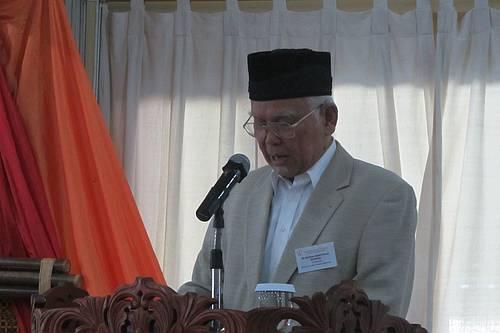More than one hundred international participants, including representatives of churches and civil society, have gathered in Bogor, Indonesia for the Global Forum on Poverty, Wealth and Ecology. On 19 June, they spoke together about poverty eradication and the concepts of economic and ecological justice lying at the heart of Christian ethics.
The forum will continue till 22 June and will conclude the AGAPE (Alternative to Economic Globalization Addressing Peoples and Earth) study process initiated by the World Council of Churches (WCC) in 2006 at its 9th Assembly in Porto Alegre, Brazil.
The AGAPE studies have focused on the relations between poverty, wealth and ecology, undertaken in Africa in 2007, Latin America and the Caribbean in 2008, Asia and the Pacific in 2009, Europe in 2010 and North America in 2011.
“The aim of the forum is to bring the AGAPE process to a conclusion, where we introduce a strong call to action by the churches and ecumenical family for poverty eradication and ecological justice,” explained Dr Rogate Mshana. Mshana is the WCC's acting associate general secretary for Public Witness and Diakonia and programme executive for Poverty, Wealth and Ecology.
“We will link these issues to the theme of the upcoming 10th Assembly of the WCC, 'God of life, lead us to justice and peace',” added Mshana. The assembly is to be held in Busan, Korea in the autumn of 2013.
Speaking about the Indonesian situation on the first day of the meeting, Dr B. Herry Priyono, a participant at the forum and an economist and academic from the Driyarkara School of Philosogy in Jakarta said, “globalization has brought with it some ambivalence, blessing as much as curse, new rich and new poor, uprootedness as much as a yearning for local rootedness.”. “He stressed that “globalization has not brought its beneficial promises to the Indonesian majority.”
“The current notion of the economy is conceptually and practically hazardous for the common good, ordinary people, the poor, and humanity. Economy should be defined as the organization of human livelihood and not as the market,” added Priyono.
The WCC president for Asia, Rev. Dr Soritua Nababan, reflected on the significance of the AGAPE process, calling it an “ecumenical journey” towards economic and ecological justice.
“Our concern today is that those who are responsible for formulating economic, financial and ecological policies have not addressed the real root causes of the problem. The concept of growth without limits is still the mantra of most policy makers,” said Nababan.
In this situation Nababan said that we need to “move towards justice and peace, where we shall experience economies of life for all and a flourishing ecology.”
Another participant, Vernie Yocogan-Diano from the Cordillera Women’s Education Action Research Centre, spoke about indigenous peoples, specially indigenous women. She also questioned the concept of “development”.
“It is ironic that indigenous peoples who have the wealth of resources are living in poverty. This is our term of development which causes imbalance or destroys our symbiotic relationship with the land and the resources,” said Yocogan-Diano.
The forum is being co-organized with the WCC member churches in Indonesia, including Huria Kristen Batak Protestan (HKBP), Communion of Churches in Indonesia (PGI), Urban Community Mission Jakarta (PMK-HKBP) and Indonesia Christian Church (GKI-West Java regional synod).
More information on AGAPE study process
WCC work on Poverty, wealth and ecology: impact of economic globalization
High resolution photos available via photos.oikoumene.org





